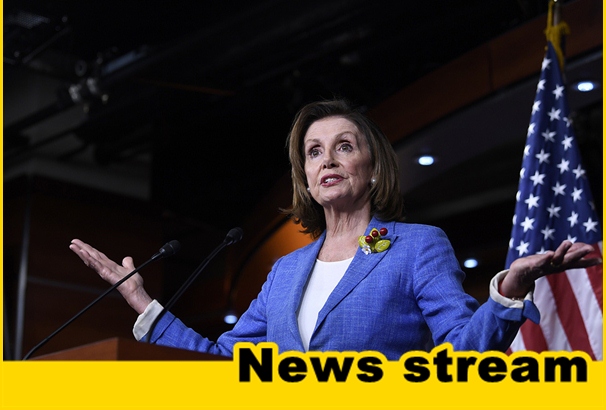
Nancy Pelosi is calling President Donald Trump’s bluff with her draft plan to bring down drug prices.
Lifting key parts of Trump’s agenda and his campaign rhetoric, the House speaker is seizing the moment to push a series of populist policies like direct government negotiations with drugmakers that Republican lawmakers have long dismissed as price-fixing.
“She wants to divide Republicans,” said former Trump HHS official Chris Meekins, now a drug industry analyst at Raymond James. “She knows full well the Senate will never let it happen.”
The six-page proposal that surfaced Monday and that Pelosi’s office says is still subject to change is more progressive than many expected. It calls for the government to negotiate the prices of the 250 costliest medicine — including insulin. The amounts would be pegged to the lower costs that prevail in developed countries overseas, including much of Europe. The Trump administration has also embraced the concept, known as an international price index, in a huge break with GOP orthodoxy.
Top Democrats insist the plan is not a political maneuver and that leadership is focused solely on writing the most ambitious bill possible. But by including Trump’s proposal on foreign pricing, the Pelosi draft offers a more expansive vision than the White House-backed legislation currently stalled in the Senate. In many ways, it captures the spirit of Trump’s populist rhetoric about greedy drug companies getting away with murder.
“There’s no reason in the world why everyday Americans pay more for lifesaving prescription drugs than any other country in the world,” New York Rep. Hakeem Jeffries, who chairs the House Democratic caucus, said Tuesday, echoing some of the president’s most reliable applause lines. “Big pharma and its anti-competitive practices are totally out of control. We need to put an end to it.”
Pelosi is also aiming for a sweet spot between moderate pragmatists and her party’s fiery progressive wing.
“The whole goal has been to make sure this is something that could actually get signed into law,” said Rep. Mark Pocan (D-Wis.), who co-chairs the Congressional Progressive Caucus that has made drug pricing a signature focus.
Drug industry experts say Pelosi’s gambit puts Trump and Senate Republicans in a bind, by either forcing a tough vote on an issue that looms large heading into the 2020 election or making the president and his allies appear to be obstructionist.
“The only way she can get any of the bolder reforms through Congress is if the president pushes Senator McConnell to move it through the Senate,“ wrote former Clinton and Obama aide Sarah Bianchi, now a head of policy research at investment bank Evercore ISI, in a note to clients. „If he doesn’t, then she can question not only the sincerity of Republicans but the president as well on this issue.”
At least two Republican senators — Rick Scott of Florida and Mike Braun of Indiana — on Tuesday signaled they’d be open to authorizing sweeping Medicare negotiation, with Braun blasting the drug industry as failing to „operate within free enterprise.“ Yet many other congressional Republicans dismissed the idea as an immediate nonstarter, saying it would amount to an egregious intrusion into the private sector.
The powerful drug lobby PhRMA immediately panned the proposal as harmful to patients.
“The House Democrat plan would end the current market-based system that has made the U.S. the global leader in developing innovative, life-saving treatments and cures,” CEO Stephen Ubl said in a statement.
White House spokesman Judd Deere said the administration hasn’t seen text or been provided details of Pelosi’s plan. „The president has been focused on this topic since he took office, and he welcomes the speaker’s ideas to help build bipartisan, bicameral consensus for the American people,” Deere said.
Democratic leaders intend to put the plan at the center of a crucial legislative stretch run this fall, assigning the forthcoming legislation a symbolic single-digit — H.R. 3 — as a sign of importance to the Democratic agenda.
The draft that began circulating this week represents a strong appeal to the party’s progressive wing. It’s far tougher on drug interests than had been expected, discarding a proposal reviled by liberals to use a third-party arbiter, instead of the government, to decide the cost of drugs. It also would apply the negotiated drug prices to the private insurance market. Progressives and consumer groups privately cheered the draft, despite officials’ warnings that details could still change.
House Democratic leaders are likely to circulate a more fleshed out version of the plan as early as Wednesday, Rep. Jan Schakowsky (D-Ill.), a member of Pelosi’s whip team, told reporters.
“I think it’s got some major elements that are quite good,” Schakowsky said. “It has to be one of our major pieces of legislation.”
The official unveiling — which will likely come initially in the form of a discussion draft rather than official legislation — will kick off a push to finalize the bill and advance it through the House’s top health committees as soon as the end of the month.
From there, Democrats have emphasized the need to pass the bill before the year’s end — regardless whether Trump supports it.
“The reliability of what the president says he’s on board with has a very short shelf life, so it’s hard to know,” Schakowsky said. “We have to move ahead anyway.”
Several potential hurdles remain, though. House progressives long skeptical of leadership’s drug pricing work want assurances a final bill will go far enough — even after the draft moved significantly left on several points.
The liberal bloc is pushing for more drugs to be subject to price negotiations and tough sanctions on drug companies that refuse to enter into talks with the government. Pelosi’s plan would impose an excise tax equal to 75 percent of the gross sales of the drug in question from the previous year.
Most important, Congressional Progressive Caucus leaders said Tuesday, is that leadership be transparent about what the legislation looks like.
“Having our input considered is important, and so that’s certainly there and that’s encouraging” Rep. Pramila Jayapal (D-Wash.) said of the draft. “But we just don’t know where we are in the process.”
Democrats are also keeping an eye on moderates, many of whom could face tough reelection fights in 2020. That group has taken a far more muted stance on drug pricing, signaling they’re focused largely on legislation that can make it into law — even if it means reining in the party’s biggest ambitions.
“There’s some common ground that could be had here to try to move something in this session,” said Rep. Ron Kind (D-Wis.). “The question is, how far does leadership want to take their non-negotiating position with Republicans and the White House?”
Still, for the first time in their nine months in power, House Democrats now have some clear direction on their top health policy priority — and are spoiling for a showdown.
„I look forward to it. It’s a big one,“ said Rep. Anna Eshoo (D-Calif.), a close Pelosi ally. „It’ll be a fight.“
Source: politico.com
See more here: news365.stream





